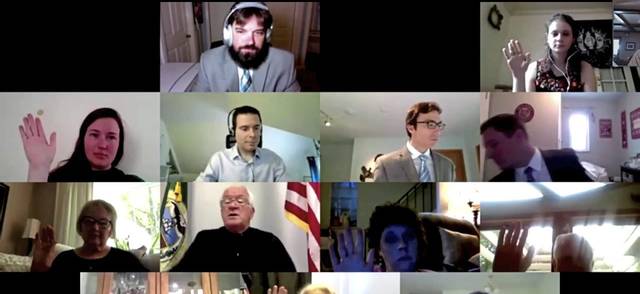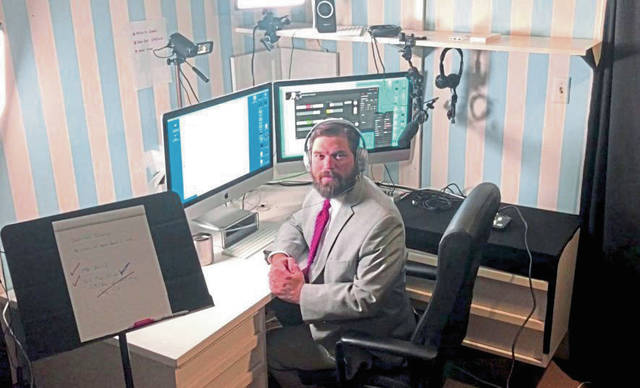The proceedings took just over eight hours, including opening statements, five witnesses, closing arguments and deliberations.
At the end of the day, the six-person jury delivered a verdict in favor of the plaintiff for $230,000 — finding that the woman who was injured in a slip-and-fall at a local grocery store deserved that much to cover the expense of five surgeries to her elbow and wrist.
It was like any other civil case typically heard in the Court of Common Pleas.
Except it was a mock trial — and everything about it was done online through Zoom.
The virtual trial was the first of its kind offered by JuryStream.
Created by Pittsburgh attorney Matthew Doebler, JuryStream — at least as an idea — had been brewing for a long time but was pushed into action because of the court shutdown this spring caused by the covid-19 pandemic. The program allows parties in a civil dispute to have their case heard by a jury online.
Doebler is not alone in his idea. Online trials have been conducted in a handful of jurisdictions across the country over the last few months, including in Texas and Florida.
Experts think the idea will continue to grow in popularity but that it’s not without pitfalls.
“I think there’s going to be a push in this direction, but I think as we learn more about it, it may give us pause about how far we want to go with this,” said Northwestern University law professor and jury scholar Shari Seidman Diamond.
How it works
Cases that will work for JuryStream, Doebler said, are ones that are ready for trial. They have made their way through the system — with discovery and depositions already completed.
“It is a dispute that just needs to be decided,” he said.
JuryStream operates as binding arbitration in civil cases — kind of like how cases can be heard on The People’s Court. Both sides have to agree that this process — conducted outside of the actual Common Pleas Court system— is how they want to resolve their case.
Once they do, Doebler said, the plaintiff’s attorney would execute a document to settle and discontinue the case on the court docket, and then give that form to an arbitrator — or the online judge — who holds it in escrow until the online jury reaches its verdict. Then, the arbitrator completes the form, files it on the docket in Common Pleas Court and it is entered as an arbitration award, enforceable by the court.
“You get the exact same outcome,” Doebler said. “It takes classic arbitration and puts it before an online jury.”
For his program, Doebler recruits jurors, paying them $100 per day — which eclipses pay in Pennsylvania, which gives jurors $9 for the first three days and $25 after that.
Using paid jurors, Doebler said, makes them more engaged in the process.
“It’s because they want to be there,” he said. “Why would you want to try a case in front of people who don’t want to be there?”
Doebler can streamline the process of jury selection by having a pre-trial conference to find out any disqualifying characteristics. Then he pre-screens the panel for conflicts of interest or other problems and makes sure they have an acceptable computer and internet speed.
So far, Doebler said — using a combination of in-store and online advertising — there are a couple thousand potential jurors in his pool. It includes a diverse group with wide socio-economic range, but Doebler recognizes that the required technology involved could eliminate some.
Diamond cited a poll by the National Center for State Courts conducted in June that found that 15% of people didn’t have an internet connection at home and 14% did not have a smart phone. Only 2% lacked both, she said.
Tony Thompson, who chairs the Allegheny County Bar Association’s civil litigation section, questioned how JuryStream will ensure the jury is representative of the community. He recognized that there is a backlog of local cases ready for trial, and that it is “not feasible to wait until things are fully back to normal.
“A lot of cases are settling that looked like they might not have settled before this,” Thompson said.
Thompson believes it is unlikely that in-person jury trials will resume in Pittsburgh any time soon.
“Logistically, you can’t put 200 people in a room to get your jury picked,” he said, citing the current orders issued by the governor.
And, he continued, even after some restrictions are lifted, how many people will be willing to gather in close quarters like is required for a trial.
“The concept, generally, of having a virtual jury trial could alleviate a lot of the concerns of having one in person,” Thompson said. “Compared to people risking their lives and coming in in-person, I’m sure people would prefer that option if it were available.”
In Westmoreland County, criminal jury trials resumed Aug. 3, said Court Administrator Amy DeMatt. There have yet to be any civil cases because none were ready to go. The number of civil trials, DeMatt said, has varied over the years. In 2017, there were 10; in 2018, there were 17; in 2019, there were seven; and this year, before the pandemic, there were three. Eight have been continued because of covid-19.
In Allegheny County, there were 77 civil jury verdicts in 2017; 66 in 2018; 69 in 2019 and nine in the first part of 2020.
In August, according to Court Administrator Chris Connors, the civil division introduced a new mediation program with court-appointed free mediators in hopes of mitigating the back log from the trial lists in March and June. There were 195 civil jury trials scheduled for September, with 270 listed for November.
Overcoming tradition
Since the beginning of the pandemic — as in jurisdictions across the country, including Allegheny County — Circuit Court Judge Denise Langford Morris in Oakland County, Michigan, has presided over countless cases over Zoom. There have been pleas and sentencings and conferences, but despite her offer to conduct trials online — either civil or criminal — no attorneys have taken her up on it.
“So far, none of the lawyers are interested,” she said.
Morris, who chairs the American Jury Trial Commission with the American Bar Association, said it might be hard to get attorneys to buy in to the online trial. They want to see jurors’ faces and reactions as they look at their clients and go through questioning, which she called one of the most important parts of a case.
Some, Morris continued, have even objected to having trials in person in the future if jurors are required to wear masks.
She sees benefits to online trials — less expense for clients; allowing attorneys to work from home; and a quicker resolution for the parties.
But, she also wonders about the possibility of taint for the jurors — being influenced by someone in their home during the trial, or even looking up information on their own as the case unfolds.
Last, Morris noted that, after almost having her computer hacked — online trials could face problems with the technology.
Doebler said during the mock trial the only technical trouble they ran into was a witness who was trying to connect to Zoom using a tablet instead of a desktop computer.
Watching the case unfold on the screen — even with all of the individuals in their own small boxes on the grid — the jurors did not appear to be distracted. They watched the attorneys and witnesses closely.
Retired Allegheny County Common Pleas Judge Eugene Scanlon, who now runs an Alternative Dispute Resolution service, presided over the JuryStream mock trial and called it a great experience.
“I thought it worked seamlessly,” he said. “I think it is a viable alternative right now because what we have right now is the great unknown.”
Scanlon worries about having a good cross-section of jurors in the pool — and the concept of having professional, paid jurors — as well as the cost to try a case in JuryStream.
Right now, Doebler said, it’s about $5,000 to produce a one-day JuryStream online case, whereas classic arbitration, including preparation and one day before a private arbitrator can cost between $5,000 and $8,500.
Doebler also thinks his program can help reduce some costs from a traditional trial, he continued, such as eliminating the expense of having to fly experts in from across the country.
Doebler admits JuryStream is not perfect for every case. Scanlon agreed.
Diamond does see JuryStream as a potential valuable tool as more people on the civil side of the law conduct remote proceedings — and cases continue to back up because of the pandemic.
“The civil calendar always takes second place to the criminal calendar,” Diamond said.
JuryStream — and programs like it — can help get cases resolved more quickly.
“It’s just a form of alternative dispute resolution,” she said. “This is another tool they might use.”
While the program is great for something like a slip-and-fall, or a “red car/blue car case,” Scanlon said, it would be too cost prohibitive for something like a lengthy medical malpractice case that might take two or more weeks of trial. In a scenario like that, JuryStream could be an additional $15,000 or more.
It will be key to identify the right subsection of cases, Scanlon said. Then, once that’s happened he continued, “They’ve got to market the hell out of it.”
Doebler is scheduled to give a presentation on JuryStream to the civil litigation section of the bar association this month.
“Online litigation is here, and I think it’s best we start to learn from it,” he said. “I really do think we’re on the verge of taking something and making it so much better.”













